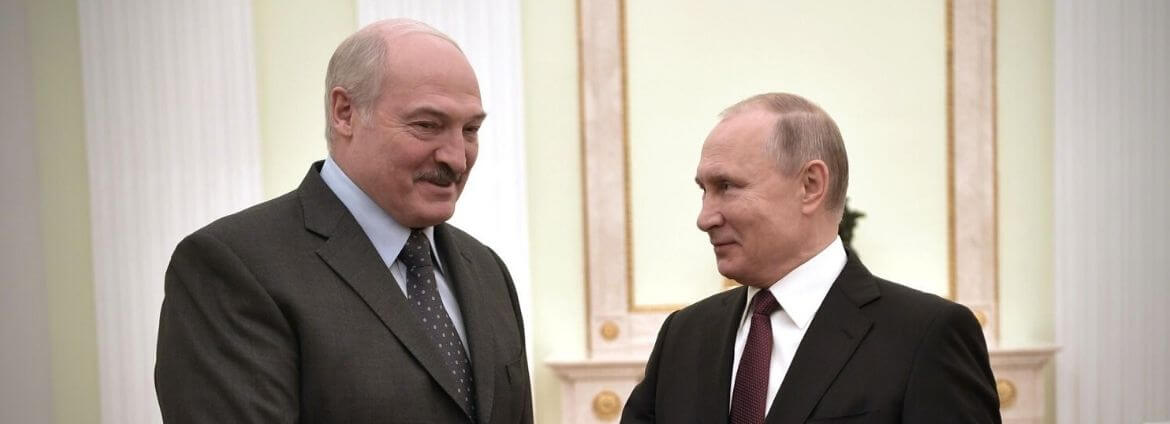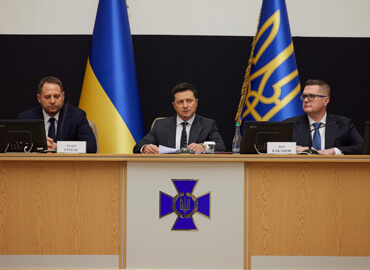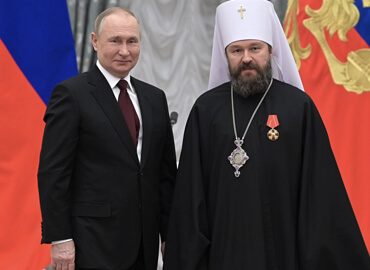Negative scenario in action
Minsk and Moscow’s endorsement of «union programs» embodies the negative scenario that has been hanging over Belarus for the past three years, since the infamous «Medvedev ultimatum.» Faced with the dilemma of being overthrown by a wave of popular anger or giving up a significant portion of national sovereignty in the name of his political survival, Lukashenko predictably chose the latter.
The Kremlin, no less predictably, is using the situation to dictate further metered support and ensure the transformation of Belarus into a second Belarusian Soviet Socialist Republic (BSSR-2). There are no «little green men» or other obvious moves on the country’s territorial integrity. Instead, there is a methodical absorption of the independence of Belarus in internal and international affairs at the suggestion of an unpopular ruler and his Kremlin partners.
We wrote about this likely scenario in the pre-election July 2020 research brief «Belarus at a crossroads: Political regime transformation and future scenarios» , which said:
«If, despite the efforts of repressive apparatus, the opposition’s mobilization capacity remains high and massive acts of civil disobedience take place, the likelihood of a new Belarus’s integration deal with Russia will increase exponentially. In the situation of an even greater Lukashenka’s delegitimization the Kremlin will, however, face deeply uncomfortable choices: To provide Lukashenka a life-saving support, to push him into a deeper integration but create a time bomb for Russia’s image among Belarusians, or to avoid providing political support to Lukashenka and therefore risk of getting a more problematic bilateral relationship with an eventual new Belarusian leadership».
Against the background of an unprecedentedly low rating and mass protests, Lukashenko has had to surrender sovereignty in several areas at the same time over the past year to receive a needed dose of Russian political and financial support.
This is first in the informational sphere. Since September 2020, all significant messages from state media have been housed in the Kremlin propaganda system. Most commentators on Belarusian events on state television are no longer even local talking heads, but propagandists of Russian and Ukrainian origin who had frightened their post-Soviet audiences with «Banderites» for years. Last year they quickly became «experts» on Belarus and switched to discrediting Belarusian «zmagars.»
Second, since last year Belarus has rapidly lost any remnants of independence in foreign policy and defense. Top state officials have even suggested deleting from the constitution language about the desire for neutrality. The key foreign policy partners of the country, besides Russia, are China, the Central Asian states, and the Persian Gulf countries.
Third, through approving «union programs» Belarus plans to radically transition to Russian legal and institutional norms in almost all areas. (More on that below.) The Belarusian authorities are still hesitant to publish them and present them to the public.
Finally, even the socio-economic area is only part of the picture. At the same time, Belarus is being «integrated» with Russia at an accelerated pace in the educational (including plans to create «common» history textbooks) and cultural spheres. Bear in mind that following the results of one of the meetings with Putin in 2019, Lukashenko pounced on the road sign «Vykonvaytse hutkasny rezhym» (Bel. – «Follow the speed limit») and gave instructions to translate it into Russian. Presently dozens of pro-Belarusian cultural organizations are being liquidated by the authorities of Belarus, including the Society of Belarusian Language (Tavarystva belaruskai movy).
The outlines of the BSSR-2 behind bureaucratic wording
Brief formulations of the content of the «union programs» (a modest paragraph for each) touch up the entire mass of agreements to which Lukashenko is committing Belarus. Judging by earlier official comments on this topic, behind each of the paragraphs are extensive documents that, with varying degrees of detail, indicate lists of laws that must be brought into conformity with the «union,» as well as deadlines for implementation.
Considering the high degree of economic dependence of Belarus and the fact that its economy is only about 3% of the size of the Russian economy, in practice, apart from rare ostentatious shows of «equality,» the «deeper integration» is about the large-scale transition of Belarus to Russian legal norms in virtually all areas, with a powerful institutional link between Belarus and Russia.
Roughly speaking, in those spheres where concise description of the «union programs» speaks about the «unification» of law, this means carbon copying Belarusian laws to match Russian laws, and where there is talk of «harmonization,» this means bringing them to a common denominator insofar as possible, mainly based on Russian needs and wishes.
As the previous Russian ambassador Dmitry Mezentsev reported at the end of 2020, the integration agreements will mean «the publication, addition, and modernization of more than 700 regulatory legal acts.»
In such a scenario, over time the staff of Belarusian ministries and departments will be subject to a sharp reduction: to track Russian legislative innovations will require fewer human resources than to independently assess the situation and create their own sets of rules and standards, parameters, and timing of reforming a particular industry. Essentially, this – the independent determination of the rules and ways of developing various spheres – is the essence of national sovereignty.
Comparing «union» integration with EU practice is inappropriate, since the economy of Germany, the largest economy of the union, accounts for about 22% of the economic power of the EU. In this case, it would be more correct to compare Belarusian-Russian «union» integration not with EU processes, but with the hypothetical integration of just Germany and Luxembourg.
The transition of Belarusian lands to the Code of Laws of the Russian Empire after the abolition of the Statute of the Grand Duchy of Lithuania in 1840 can be cited as a distant historical analogy to this radical legal transition in Belarus. The closest analogy is the BSSR model, where Minsk retains only nominal sovereignty, but in practice acts with Moscow’s permission in the most important domestic and international affairs.
Reporting to the Kremlin
The entire negotiating history of the new integration pact confirms the extreme degree of detachment of those in power from Belarusian society. The Belarusian authorities not only did not inform the public about the content of the negotiations. They did not even consider it necessary to notify them of their most important milestones.
It should be noted that the Belarusian authorities initially concealed the so-called 31st «integration roadmap» about the political component of integration. Moreover, they even publicly denied its existence. As a result, Belarusians learned about the proposals for a single currency and supranational bodies from Dmitry Medvedev’s message at the end of 2019 negotiations. And although Lukashenko has apparently pushed back from this document at the moment, both Putin and his press secretary made it absolutely clear that the political component of integration was not removed from the agenda forever, but was only tabled for the near future.
Further, Belarusians also had the opportunity to learn about the imminent approval of the «union programs» at the end of August 2021 not directly, but from the Russian media. They reported the announcement of the Ambassador of Belarus to Russia Vladimir Semashko, who informed a Russian governor and deputy about the upcoming event, but not the Belarusian public or, at the very least, Belarusian parliamentarians.
Finally, the Russian government, not Belarusian state bodies, shared a brief description of the content of 28 «union programs» in September 2021. That is, the Belarusian authorities are conducting secret agreements and consider it necessary to report not to the Belarusian people, but exclusively to their Russian colleagues.
The long integration saga and the price of sovereignty
And earlier, on the eve of the presidential elections or shortly thereafter, Lukashenko signed another package of documents on ever deeper integration with Russia. These integration deals, involving the surrender of more and more pieces of Belarusian sovereignty in various spheres, are sold for guarantees of further political and financial support from the Kremlin, especially in the energy sector.
On the eve of the 2015 elections, Lukashenko sold Belarus’s participation in the Eurasian Economic Union (EAEU) for more lucrative oil deals. As a result of a two-stage bargaining (for the signing of the Treaty on the EAEU and its ratification), Lukashenko negotiated for the preservation of the full volume of export customs duties on oil products made from Russian oil.
Earlier, against the background of the 2010 elections, Lukashenko exchanged Belarus’s involvement in the Eurasian Economic Space for an agreement on duty-free supplies of Russian oil. It was signed literally 10 days before the elections, and within 10 days after the elections and the brutal quashing of the protests, all 17 CES agreements entered into force. «Even if I had to surrender, as they say, for 4 billion a year – I am ready… 4 billion is money for our state and for our people,» Lukashenko said then about the agreement.
That is, the ongoing big bargaining between Lukashenko and the Kremlin itself is not something new – these kinds of relations have existed for more than one decade. The qualitative difference is that now at stake is an increasingly excessive piece of national sovereignty, which is intended to tie Belarus hand and foot to its eastern neighbor even after Lukashenko leaves. As Dmitry Medvedev put it in 2019, work on a large integration project can be considered complete only when «we change our legislation irrevocably.»
It seems that this time Lukashenko intends to exchange the BSSR-2 model not only for financial benefits from oil and gas agreements, but also for the Kremlin’s recognition of a new constitution, which is designed to ensure his further rule and likely a subsequent dynastic transition of power.
Considering the how little support there is for Lukashenko in Belarusian society and the significant effect of Western sanctions, this scenario is still not a foregone conclusion, but its likelihood has increased significantly in recent months and, with constant political and financial support from the Kremlin, will continue to pose a critical threat to Belarusian sovereignty.
Материал доступен на русском языке: Добро пожаловать в БССР-2: «Союзные программы» и эрозия суверенитета Беларуси











